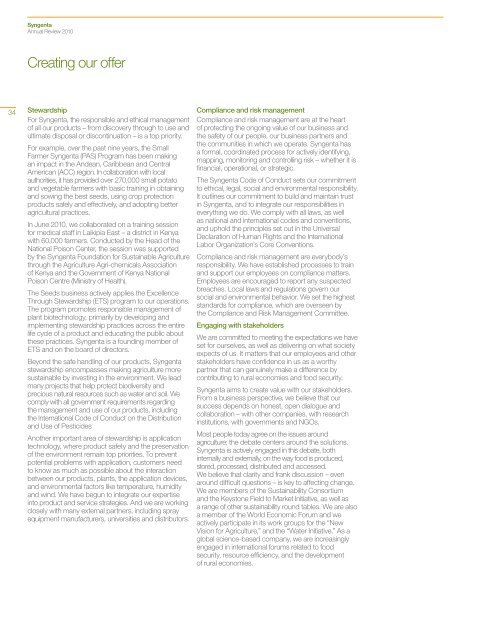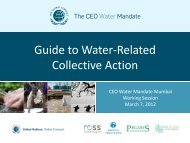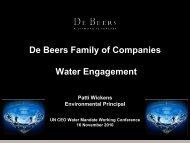Syngenta Annual Review 2010 - CEO Water Mandate
Syngenta Annual Review 2010 - CEO Water Mandate
Syngenta Annual Review 2010 - CEO Water Mandate
Create successful ePaper yourself
Turn your PDF publications into a flip-book with our unique Google optimized e-Paper software.
<strong>Syngenta</strong><br />
<strong>Annual</strong> <strong>Review</strong> <strong>2010</strong><br />
Creating our offer<br />
34<br />
Stewardship<br />
For <strong>Syngenta</strong>, the responsible and ethical management<br />
of all our products – from discovery through to use and<br />
ultimate disposal or discontinuation – is a top priority.<br />
For example, over the past nine years, the Small<br />
Farmer <strong>Syngenta</strong> (PAS) Program has been making<br />
an impact in the Andean, Caribbean and Central<br />
American (ACC) region. In collaboration with local<br />
authorities, it has provided over 270,000 small potato<br />
and vegetable farmers with basic training in obtaining<br />
and sowing the best seeds, using crop protection<br />
products safely and effectively, and adopting better<br />
agricultural practices.<br />
In June <strong>2010</strong>, we collaborated on a training session<br />
for medical staff in Laikipia East – a district in Kenya<br />
with 60,000 farmers. Conducted by the Head of the<br />
National Poison Center, the session was supported<br />
by the <strong>Syngenta</strong> Foundation for Sustainable Agriculture<br />
through the Agriculture Agri-chemicals Association<br />
of Kenya and the Government of Kenya National<br />
Poison Centre (Ministry of Health).<br />
The Seeds business actively applies the Excellence<br />
Through Stewardship (ETS) program to our operations.<br />
The program promotes responsible management of<br />
plant biotechnology, primarily by developing and<br />
implementing stewardship practices across the entire<br />
life cycle of a product and educating the public about<br />
these practices. <strong>Syngenta</strong> is a founding member of<br />
ETS and on the board of directors.<br />
Beyond the safe handling of our products, <strong>Syngenta</strong><br />
stewardship encompasses making agriculture more<br />
sustainable by investing in the environment. We lead<br />
many projects that help protect biodiversity and<br />
precious natural resources such as water and soil. We<br />
comply with all government requirements regarding<br />
the management and use of our products, including<br />
the International Code of Conduct on the Distribution<br />
and Use of Pesticides<br />
Another important area of stewardship is application<br />
technology, where product safety and the preservation<br />
of the environment remain top priorities. To prevent<br />
potential problems with application, customers need<br />
to know as much as possible about the interaction<br />
between our products, plants, the application devices,<br />
and environmental factors like temperature, humidity<br />
and wind. We have begun to integrate our expertise<br />
into product and service strategies. And we are working<br />
closely with many external partners, including spray<br />
equipment manufacturers, universities and distributors.<br />
Compliance and risk management<br />
Compliance and risk management are at the heart<br />
of protecting the ongoing value of our business and<br />
the safety of our people, our business partners and<br />
the communities in which we operate. <strong>Syngenta</strong> has<br />
a formal, coordinated process for actively identifying,<br />
mapping, monitoring and controlling risk – whether it is<br />
financial, operational, or strategic.<br />
The <strong>Syngenta</strong> Code of Conduct sets our commitment<br />
to ethical, legal, social and environmental responsibility.<br />
It outlines our commitment to build and maintain trust<br />
in <strong>Syngenta</strong>, and to integrate our responsibilities in<br />
everything we do. We comply with all laws, as well<br />
as national and international codes and conventions,<br />
and uphold the principles set out in the Universal<br />
Declaration of Human Rights and the International<br />
Labor Organization’s Core Conventions.<br />
Compliance and risk management are everybody’s<br />
responsibility. We have established processes to train<br />
and support our employees on compliance matters.<br />
Employees are encouraged to report any suspected<br />
breaches. Local laws and regulations govern our<br />
social and environmental behavior. We set the highest<br />
standards for compliance, which are overseen by<br />
the Compliance and Risk Management Committee.<br />
Engaging with stakeholders<br />
We are committed to meeting the expectations we have<br />
set for ourselves, as well as delivering on what society<br />
expects of us. It matters that our employees and other<br />
stakeholders have confidence in us as a worthy<br />
partner that can genuinely make a difference by<br />
contributing to rural economies and food security.<br />
<strong>Syngenta</strong> aims to create value with our stakeholders.<br />
From a business perspective, we believe that our<br />
success depends on honest, open dialogue and<br />
collaboration – with other companies, with research<br />
institutions, with governments and NGOs.<br />
Most people today agree on the issues around<br />
agriculture; the debate centers around the solutions.<br />
<strong>Syngenta</strong> is actively engaged in this debate, both<br />
internally and externally, on the way food is produced,<br />
stored, processed, distributed and accessed.<br />
We believe that clarity and frank discussion – even<br />
around difficult questions – is key to affecting change.<br />
We are members of the Sustainability Consortium<br />
and the Keystone Field to Market Initiative, as well as<br />
a range of other sustainability round tables. We are also<br />
a member of the World Economic Forum and we<br />
actively participate in its work groups for the “New<br />
Vision for Agriculture,” and the “<strong>Water</strong> Initiative.” As a<br />
global science-based company, we are increasingly<br />
engaged in international forums related to food<br />
security, resource efficiency, and the development<br />
of rural economies.











